The disastrous run of British Conservative prime ministers since 2010 has culminated in the collapse of the two-month premiership of Liz Truss. But just because it’s been both a tragedy for Britain and a farce that’s shocked the world, doesn’t mean this is as bad as it can get, writes Political Editor Nick Powell.
The markets’ verdict on the resignation of Liz Truss was damning. The pound rose and the cost of government borrowing fell. The uncertainty of not knowing who would be British prime minister in 10 days’ time felt better than the lurching from crisis to crisis that had become the hallmark of the UK’s shortest-ever premiership.
It’s a record that might never be broken. The next prime minister will surely last longer. The Conservative party is making up the rules as it goes along but whatever the method of selection, whoever has the fortune -or misfortune- to become the next occupant of 10 Downing Street is there until the next Westminster election.
The UK is about to have a caretaker Prime Minister, destined to mind the shop until an election in a year or two. The Conservatives are almost certainly heading for a heavy defeat but can hope that a period of relative calm will save them from the near obliteration that current polling numbers suggest.
It’s said that people go bankrupt slowly and then quickly and that’s turned out to be true of political bankruptcy as well. The Conservatives used to be famed as a pragmatic party, for them even the European People’s Party was too idealogical. Indeed it is joked that the only other party with which the Conservatives ever had a successful relationship was the Yugoslav League of Communists.
But the Conservatives became gripped with an ideology that was more than anti-European, insisting that membership of the EU was holding back Britain from becoming a free market paradise. The UK has now had three Prime Ministers who searched in vain for those elusive ‘Brexit opportunities’, after David Cameron declined to even try.
He accepted the logic that he could no longer lead a party with which he profoundly disagreed but his fellow supporters of staying in EU, Theresa May and Liz Truss, decided to give it a go. May tried to effectively keep the UK in the single market for physical goods, outraging all the Brexit true believers. Truss tried the opposite approach, with tax cuts and spending increases that presupposed the dawn of a post-Brexit paradise. The financial markets gave that magical thinking short shrift.
Of course, in between those two women was Boris Johnson, who had campaigned for Brexit, whatever he actually believed him. He might well offer his services again. A caretaker Prime minister famous for caring about nothing but himself. One should never suppose that things are so bad that they cannot get any worse.


















































